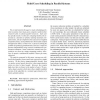Free Online Productivity Tools
i2Speak
i2Symbol
i2OCR
iTex2Img
iWeb2Print
iWeb2Shot
i2Type
iPdf2Split
iPdf2Merge
i2Bopomofo
i2Arabic
i2Style
i2Image
i2PDF
iLatex2Rtf
Sci2ools
126
click to vote
IPPS
2009
IEEE
2009
IEEE
Multi-users scheduling in parallel systems
We are interested in this paper to study scheduling problems in systems where many users compete to perform their respective jobs on shared parallel resources. Each user has specific needs or wishes for computing his/her jobs expressed as a function to optimize (among maximum completion time, sum of completion times and sum of weighted completion times). Such problems have been mainly studied through Game Theory. In this work, we focus on solving the problem by optimizing simultaneously each user’s objective function independently using classical combinatorial optimization techniques. Some results have already been proposed for two users on a single computing resource. However, no generic combinatorial method is known for many objectives. The analysis proposed in this paper concerns an arbitrarily fixed number of users and is not restricted to a single resource. We first derive inapproximability bounds; then we analyze several greedy heuristics whose approximation ratios are clos...
Completion Times | Distributed And Parallel Computing | IPPS 2009 | Maximum Completion Time | Weighted Completion Times |
Related Content
| Added | 24 May 2010 |
| Updated | 24 May 2010 |
| Type | Conference |
| Year | 2009 |
| Where | IPPS |
| Authors | Erik Saule, Denis Trystram |
Comments (0)

